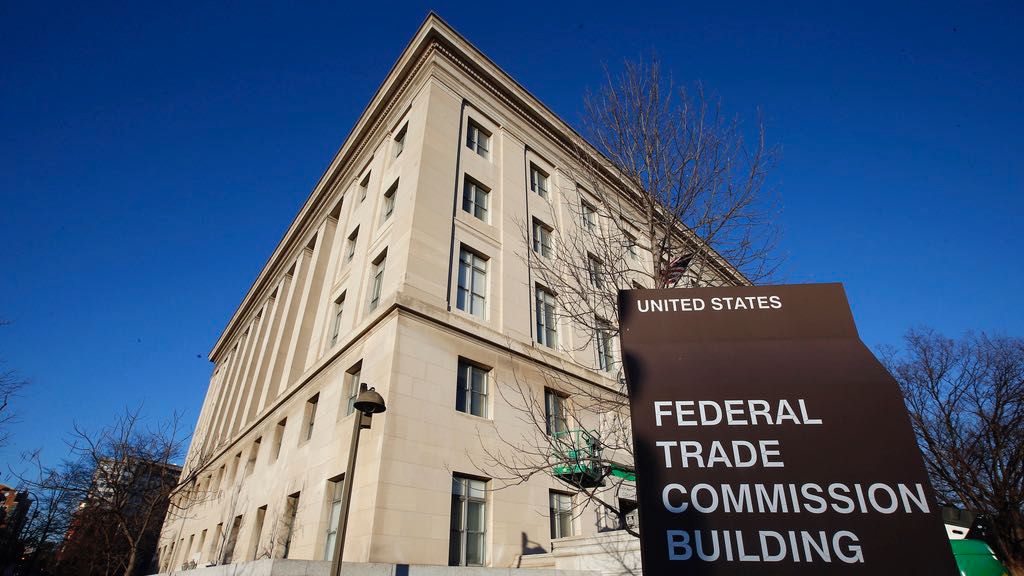The Federal Trade Commission has passed a rule banning U.S. companies from forcing noncompete clause agreements on employees, and ruling nearly all existing clause unenforceable. Those clauses, which prevent workers from freely moving from job to job, affect about 30 million people — about one out of every five workers.
But the new FTC rule is bound to be challenged in court, with arguments expected to say the commission is overstepping its legal bounds.
In a press release, the FTC stated that noncompetes were ruled to be an "unfair method of competition" that prevents workers from finding new jobs and employers from hiring, cools innovation and new business formation and leads to higher prices for consumers.
"Workers ought to have the right to choose who they want to work for," President Joe Biden said in a post on social media hailing the decision.
Noncompete clauses are, generally, time-limited sections of employment contracts that prevent a person from working for a competing employer or starting a competing business after leaving the employer.
Existing noncompetes for nearly all workers will no longer be enforceable after the rule’s effective date, 120 days after it is published in the Federal Register.
The only class of employees who will remain subject to noncompetes are senior executives under existing clauses; employers will be banned from entering into or enforcing any new noncompetes.
The rule passed in a 3-2 vote of the five Federal Trade Commissioners, with the dissenting votes coming from the body’s newest commissioners, Melissa Holyoak and Andrew Ferguson. Both are Republicans sworn into their positions less than a month ago.
Holyoak and Ferguson — recent former solicitors general of Utah and Virginia, respectively — both argued against the commission’s authority to make such a wide-ranging rule.
"I do not believe we have the power to nullify tens of millions of existing contracts, to preempt the laws of 46 states, to declare categorically unlawful a species of contract that was lawful when the FTC Act was adopted, and to declare those contracts unlawful across the whole country, irrespective of their terms, conditions, historical context and competitive effects," Ferguson said. "Accordingly, I respectfully dissent."
The FTC cited a handful of examples of noncompete agreements hurting workers — from a single-father in Florida who left his new security guard job when his childcare fell through, only to be blocked from taking a higher-paying job months later by his two-year noncompete clause, to a factory manager who lost his life-savings fighting a noncompete to take a job at a rival factory providing better pay and better hours.
A study of employee mobility from one workplace to another, in the wake of a 1985 Michigan law that repealed a ban on noncompetes, indicated that noncompete clauses tend to stifle workers in areas where noncompetes are enforced. The study then wondered if innovators within an industry may try to migrate to regions free of noncompetes, suggesting anti-noncompete policies might explain the movement of talent to areas like California’s Silicon Valley.
And comments submitted to the FTC’s website during the rule’s comment period appeared supportive of the ban — overwhelmingly so, according to an FTC count that found more than 25,000 supportive comments from more than 26,000 total.
However, the rule was unpopular among trade associations and chambers of commerce — agencies that, as a general rule, advocate in favor of employers.
“The final rule to ban all noncompete agreements nationwide—except existing noncompetes for senior executives— is a radical departure from hundreds of years of legal precedent,” said Ben Brubeck, vice president of regulatory, legal and state affairs for Associated Builders and Contractors, a trade organization. “Ultimately, this vastly over-broad rule will invalidate millions of reasonable contracts—including construction project contracts—around the country that are beneficial for both businesses and employees.”
The U.S. Chamber of Commerce — the pro-business lobbying giant — takes a similar tact to Ferguson, arguing that the FTC lacks the constitutional or statutory authority to issue the a rule addressing unfair methods of competition.
The FTC argues that it holds its authority under Section Five of the FTC Act — the law that created the commission — which states that the commission is "empowered and directed to prevent persons, partnerships or corporations…from using unfair methods of competition in or affecting commerce and unfair or deceptive acts or practices in or affecting commerce."
"Arguing that the FTC lacks this authority requires ignoring the most straightforward reading of the text," FTC Chair Lina Khan said Tuesday, adding that federal courts have historically endorsed the FTC’s rule-making power, as in the case of National Petroleum Refiners Association v. FTC, in which the D.C. Appeals Court said simple reading of the law notes the commission may make rules and regulations for carrying out the provisions of Section Five. "To my mind, we need to be honoring what courts have said over what courts in the future might say in ways that will conflict with clear precedent already on the books."



